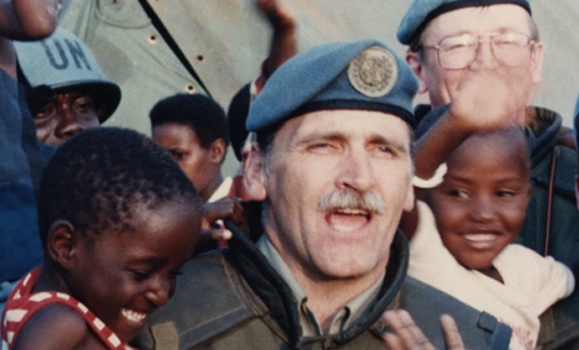The term “moral injury” is relatively recent in our understanding of trauma.
When Lieutenant-General Roméo Dallaire led United Nations peacekeeping troops in Rwanda during the 1994 genocide against the Tutsi that took a million lives over 100 days, few Canadians beyond the military were aware of the severe psychological damage that witnessing such moral atrocities can cause.
That changed in 2003 when Dallaire published Shake Hands With the Devil: The Failure of Humanity in Rwanda, recounting his experience witnessing the genocide.
Dallaire’s revelation that he sustained PTSD during his mission helped destigmatize this potentially devastating operational stress injury among military veterans. But it also helped us understand how all of us can confront moral injury in our daily lives.
Leading a virtual conversation
The former Canadian senator (2005-2014) will expound on moral injury and moral courage in light of the many ethical dilemmas we face today — from health-care workers on the front lines of the COVID pandemic to America’s withdrawal from Afghanistan to the rise of extremist violence around the world — in a series of virtual talks co-hosted by the Dallaire Institute for Children, Peace, and Security at Dalhousie University.
In an introductory online conversation on Sept. 22, entitled “Moral Leadership and Courage from Different Perspectives,” Dallaire will describe the moral dilemmas he faced during the genocide and how his refusal to leave has affected his mental health to this day.
He will be joined by Major General Patrick Cammaert, former UN force commander in Congo and advisor to the UN Secretary-General, and Congolese Canadian Michel Chikwanine, who was recruited and used as a soldier when he was only five years old, and now speaks widely as a UN fellow.
The eight-session Cleveringa Dallaire Critical Conversation Series culminates Nov. 10 with a special Remembrance Day session featuring General Dallaire, Murray Sinclair, James Orbinski, and others. The series is co-led by Leiden University in the Netherlands, where Dallaire holds the 2020-21 Cleveringa Chair.
The mental cost of moral courage
As force commander for the UN mission in Rwanda in 1993, Dallaire warned UN authorities that he lacked sufficient resources to stop the attack by Hutu extremists against Tutsi people and Hutu moderates.
The UN failed to provide help and ordered Dallaire to withdraw. He refused without giving it a second thought.
“It made sense to me that saving 32,000 lives from being slaughtered was better than abandoning them,” he said. “I knew that no matter the legal implications — no matter how they tried to crucify me legally — it would never come close to what I would feel if I had abandoned those people.”
There was indeed a heavy toll to pay for the decision to stay, not the least of which were the PTSD and moral injury that haunt Dallaire to this day. His book, Waiting for First Light, he admitted attempting suicide four times before emerging from a paralyzing depression.
“Moral injury is a deep and profound assault on what you are as a human being,” he says. “It’s when you encounter situations that go against every element of value, every reference you have in your background, your education, your family, your community, your social values. And it creates an instinctive reaction, a gut feeling … that comes from the whole body politic of who you are.”
The Dallaire Institute for Children, Peace, and Security has just embarked on a five-year research program, funded by Veterans Affairs Canada, to study the mental health effects on military personnel who encountered children recruited and used as soldiers and other morally injurious events during military service.
As founder of the Dallaire Institute at Dalhousie, Dallaire is also unequivocal on the issue that occupies most of his time these days—children recruited and used as soldiers.
“I see children as the front edge of the advancement of peace and security in the world. It is my fundamental belief that if we crack the code on the prevention of abuse of children — if we can get the children out of the equation and place child rights first, up front — I believe that we'll get people around the table and start moving other scenarios.”
For registration information and more on the Cleveringa series — which will examine the cost of moral courage, spiritual recovery from witnessing and PTSD, and how embracing humanity can bring about a culture change aimed at sustaining mental health — visit the Dallaire Institute website.

